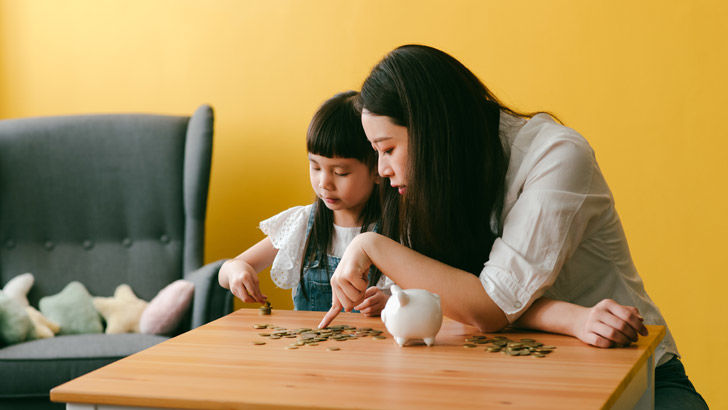Should you pay your kids for doing chores?
By Susan Hely
It makes sense to talk to your children about money, particularly with rising cost-of-living pressures. But it can be a complicated and emotional topic.
Around half of parents don't speak about money with their kids, according to the CommBank Household Spending Intentions (HSI) index. One reason, say those in the survey, is that money is too tight in their household.
There's plenty of anxiety, with one in four people with a mortgage worrying about how to pay it and 52% of Australians feeling more stressed about their finances than they were a year ago, according to Salvation Army research.
As well, 40% of parents admit that their knowledge of financial topics is limited.
But talking about how money is scarce can give children an understanding of how the household finances work and be beneficial, says Yish Koh, managing director of Kit, a pocket money app for kids that is owned by the Commonwealth Bank.
Koh says parents are the most important influence when it comes to money.
Hearing how to carefully navigate the finances from a trusted source, rather than via social media - which didn't exist in their parents' time - is crucial.
The messages from social media can set kids up for unrealistic aspirations and reckless behaviour.
After all, kids aged six to 13 spend on average 16 hours on the internet each week, according to Roy Morgan's Young Australian Survey. Ninety-eight percent of kids under 18 have a device for playing interactive games and spend more than six hours, on average, playing computer and electronic games a week, too.
About three-quarters of parents are concerned about the influence of online games on their children's attitudes to money, particularly ones that encourage spending.
Around a third of kids aspire to earn money as a social media or gaming influencer. One in five showed an interest in cryptocurrency and non-fungible tokens (NFTs). Almost a third (31%) say they want to learn more about online gaming currency and in-app purchases.
How good are Aussie kids at saving money
Just how are kids going with money? Half of the parents interviewed claim their kids' financial literacy and capacity is average, poor or terrible. Only one in five (20%) rates it as excellent, with the ability to budget (57%), how to save (56%) and how to prioritise spending (55%) being key areas for improvement.
Parents have a vested interest in their kids managing and saving money well. You don't want to be propping your kids up with financial help as you grow older. You want thrifty kids who are honest, not carrying loads of debt.
Around half of parents say their children have spent their money - an average of $180 - without the adults knowing. Twenty percent of kids racked up between $200 and $499. The culprits are in-game credits (37%) and in-app purchases (33%). Around a third of parents say their kids have taken money from their wallet and 25% have used their credit card for online shopping.
All kids are different and there isn't one right way to teach them about money, says Koh. With my two kids, I changed the tone of my conversations as well as the strategy for each of them to get them engaged.

One parent who is determined to make her three kids responsible with money is Caroline Hamilton, who likes to introduce conversations about money in everyday settings.
As a single mum with a mortgage, Caroline says her three kids - Maggi, 13, Zara, 12 and Ted, 8 - need to understand the value of money and realise they need to watch their budget. She explains about money coming into the family and where it is spent.
"It's really important to me that we live within our means," says Hamilton.
For example, when the kids ask for a treat from the ice-cream truck, she points out that they could buy ice-creams from the truck or they could buy a box of them from the supermarket and have ice-creams for a week for the same amount of money.
Her kids love having long showers and she'll let them know the expense of taking a long shower, not to mention the environmental consequences.
"It's gotten easier as they've gotten older, to be able to have those age-appropriate conversations around money," says Hamilton. It is important to instil in them the ability to speak openly about it.
One money-making idea that worked for her kids is the return-and-earn recycling program that pays a 10 cent refund for an eligible drink container in NSW.
"I turned the garage into a mini recycling depot. It got the kids involved to earn money that way. And then we would split it three ways so that they had to put in an equal amount of effort to earn."
When Hamilton's children ask for new shoes or a phone upgrade, she will introduce a savings goal, partnering with them for big purchases. "You save up half the money, I will contribute." That way, they have skin in the game.
Her kids have piggy banks with four compartments: save, spend, invest and give.
If they want a branded item, Hamilton talks to them about how they can buy a perfectly good bag or T-shirt from an affordable department store and save a lot of money.
"If they still want the expensive one, I say this is what we're going to do," referring to the savings goal.
Her own parents instilled in her that you don't spend what you don't have, and that a man is not a plan. Her only debt is the mortgage.

Should you pay your kids for household chores?
An allowance or pocket money can be a great teaching tool. About 90% of parents insist their children earn pocket money by doing chores, according to the HSI survey.
There are strong views from parents that certain chores should be part of kids' contribution to the smooth running of family life. They believe paying for basic chores can set their kids up to believe they are entitled to money every time they help around the house.
Some parents rotate the chores to give their kids broad life skills and help them become competent at keeping a clean, well-run house.
For example, Caroline Hamilton's three kids have a daily routine that isn't linked to pocket money. It includes emptying the dishwasher, hanging out and bringing in the washing, making their school lunches and beds, plus keeping their bedrooms tidy. They must walk and feed the family dog.
Hamilton says they don't receive money for doing the basics, but they can be paid for extra chores.
She starts basic pocket money of $5 a week at age 12 "because before the age of 12, as far as I'm concerned, they don't have expenses". Her kids have some money from birthdays but if they want extra for a special purchase, they must do extra chores such as washing the car and weeding the garden. Cashing in recycling helps them earn extra money.
Negotiating a rate for certain chores is a good educational step for kids.
Yish Koh, from the Kit app, says parents need to give their kids some autonomy about their own money. When you're trying to teach them how to save, you start small and then you get a small win, she says.
"You build that confidence and set longer savings goals and bigger savings."
When they are under 14, typically the only way for them to earn money is working for their parents. I know a family who clean the house themselves, putting the money that they would have given to a cleaner in a jar for the family to spend.
Get stories like this in our newsletters.



